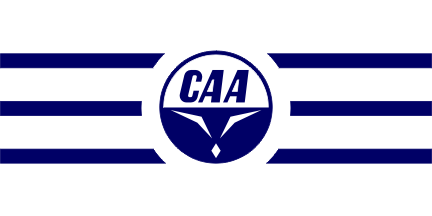
Last modified: 2006-08-12 by bruce berry
Keywords: zimbabwe | air zimbabwe | air rhodesia | central african airways |
Links: FOTW homepage |
search |
disclaimer and copyright |
write us |
mirrors
![[Air Zimbabwe flag]](../images/z/zw-airz.gif) image
by Bruce Berry, 17 Feb 1998
See also:
image
by Bruce Berry, 17 Feb 1998
See also:
Air Zimbabwe, Zimbabwe's national airline,
is a parastatal organisation and successor to Air Rhodesia which changed its
name and corporate identity following independence in 1980. The new
colours are taken from the Zimbabwean flag and reflect the status of the airline
as the "national carrier".
Bruce Berry, 17 Feb 1998
![[Air Rhodesia flag]](../images/z/zw$arhd.gif) image
by Antonio Martins, 20 Nov 1997
image
by Antonio Martins, 20 Nov 1997The first domestic airline in Zimbabwe
was formed in 1933 and called Rhodesia and Nyasaland Airways and operated
flights between Salisbury, Bulawayo and Johannesburg and later between Salisbury
and Beira. During World War II the airline was taken over by the
government and was renamed Central African Airways (CAA). The first
international flights to Britain began in 1947. After the dissolution of
the Federation of Rhodesia and Nyasland in December 1963, it was agreed that CAA
would continue with subsidiary territorial airlines. However, with the
declaration of UDI in Rhodesia in 1965 and the subsequent political and economic
isolation of Rhodesia, Air Rhodesia was established as a national airline in
September 1967 and CAA ceased to operate. Air Rhodesia operated local and
regional flights. It was renamed Air Zimbabwe Rhodesia in June 1979 and
became Air Zimbabwe, with new corporate colours (see above) following
independence in April 1980.
Bruce Berry, 17 Feb 1998
 image
by Martin Grieve, 06 Apr 2004
image
by Martin Grieve, 06 Apr 2004
To complete the airline flags used in Zimbabwe, here is the flag and short history of Central African Airways (1946-1967).
Air Zimbabwe can trace its long history back directly to the formation,
on 1 June 1946, of Central African Airways (CAA), which came into being as the joint airline of Southern Rhodesia (now
Zimbabwe), Northern
Rhodesia (now Zambia) and Nyasaland (now
Malawi), with 50%, 35% and 15% respectively of its share capital being held by the governments of those
three countries.
At its formation, CAA acquired some of the assets and personnel of Southern Rhodesia Air Services (SRAS), a combined airline and
communications squadron that had been formed at the beginning of World War II from the dissolution of Rhodesia and Nyasaland Airways (RANA).
RANA had itself been formed in October 1933 by the merger of two small privately owned companies which, in the late 1920s, had provided Central
Africa with its first "regular" air services (for detailed history see http://home.wanadoo.nl/rhodesian/rana.htm).
Central African Airways started operations with a mixture of ex SRAS aircraft, but soon took delivery of five De Havilland Doves, and three
Vickers Vikings and later acquired a total of seven Doves and 12 Vikings as its services steadily expanded to cover a route network extending as far north as Nairobi and as far south as Johannesburg, as far east as
Blantyre and as far west as Maun in Bechuanaland (now Botswana). In August 1948 CAA inaugurated the first air freight service in Africa,
using two Bristol 170 Freighters leased from Britain's Ministry of Civil Aviation. A weekly 'Zambezi' service with Vikings between Salisbury and
London was introduced in April 1953. Vickers Viscount aircraft were introduced in June 1956.
Following the break-up of the Federation of Rhodesia and Nyasaland in December 1963, Northern Rhodesia attained its independence as Zambia,
and Nyasaland as Malawi in 1964. The governments of both new countries wished to have their own national airlines but it was quickly realised
that this dream would not easily be fulfilled. CAA's engineering base, stores and most of the infrastructure and personnel needed to support
the airline were based at Salisbury in Southern Rhodesia and an agreement reached in December 1963 enabled CAA to remain in existence
but be responsible to a higher authority consisting of transport ministers from the three governments. Separate subsidiaries of CAA were
formed, to operate in each country. These were Air Malawi Ltd, Zambia Airways Ltd and
Air Rhodesia (Pvt) Ltd. All assets in each country at the time of the Federation's dissolution became part of that country's airline. CAA operated the Viscounts on behalf of each airline, and an
ingenious arrangement of detachable nameplates on each side of the rear fuselage enabled the same aircraft to be used on services without seriously offending anybody's national pride - the logos being a winged
leopard in a circle for Air Malawi, a Fish Eagle in a horizontal shield for Zambia Airways and a Zimbabwe Bird in an inverted triangle for Air
Rhodesia.
Rhodesia's Unilateral Declaration of Independence on 11 November 1965 and the subsequent imposition of sanctions imposed by Britain and
independent African states, closed down almost all international flights operating through Rhodesia, with the exception of Portugal's TAP and South African Airways. CAA was barred from operating to most
neighbouring states. The deterioration in relations existing between the governments of Rhodesia and the two airline partners caused the
tripartite airline to become increasingly unworkable after November 1965 and the CAA was broken up into separate national entities at the end of
August 1967.
The flag used by CAA contained the airline's logo in the centre of a white field superimposed on three dark blue horizontal lines -
representing the three "home" territories.
(CAA History source: http://home.iprimus.com.au/rob_rickards/viscounts/history.htm).
Bruce Berry, 06 Apr, 2004